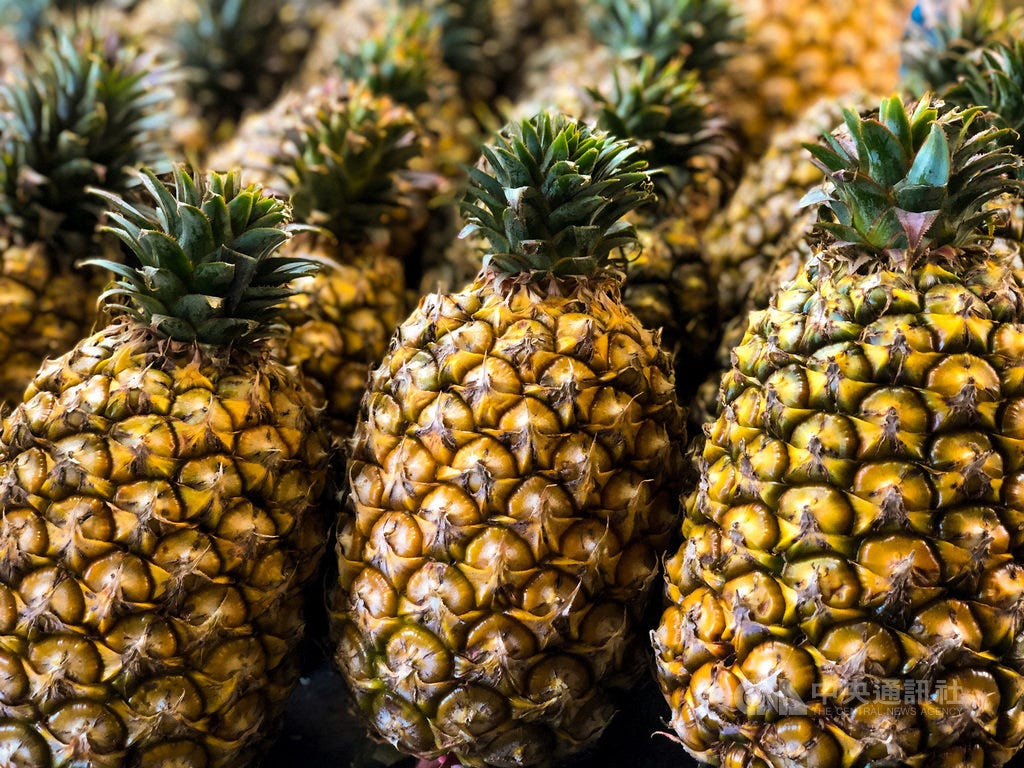The Prosciutto for Pineapples Freedom Plan
How dropping agricultural trade barriers with EU will help Taiwan Win Friends and reduce influence from China
China’s plan to put pressure on Taiwanese farmers by the unexpected ban on Taiwanese pineapples appear to have backfired spectacularly. Taiwanese consumers, with a little help from their friends, made #freedompineapple go viral and cleared the shelves of the delicious fruit. However, one has to wonder if gobbling up every farm produce that China bans is a long-term strategy. What’s next? #teafortaiwan? #democracytuna? What if we’re dealing with the Fourfingered Threadfin, where 80 percent of the production is exported and almost all of it goes to China? There has to be a longer-term solution for Taiwanese farmers and fishers than promotion by presidential twitter.
A better plan will see Taiwanese produce make their way to more markets around the world, spreading the risk and potentially garnering premium prices. But one thing stands in Taiwan’s way : Taiwan’s own unfair agricultural restrictions and tariffs. To quote from an ECIPE paper:
Taiwan has a highly protected agricultural sector. High tariffs and costly sanitary procedures are the main instruments of protection. US sources complain about a very costly import authorisation procedure for rice, costly regulations on Maximum Residue Limits (MRLs), some labelling issues, and remaining quotas. EU exporters have complained about non-recognition of EU disease-free status, annual and non-risk assessment-based on-site inspections, and inconsistent sanitary border inspections. Exports affected include pork and poultry, beef, fruit and vegetables. Taiwan does not recognise Central and Eastern European member states for accreditation of organic produce.
That’s a very official way of putting what a European trade official said to me with much more indignation…almost a tinge of hurt feelings: “Prosciutto! Why do they block our prosciutto?”
I talked to National Central University professor Dachrahn Wu (吳大任) and asked him why Taiwan has such onerous duties on agricultural imports.
“Although agricultural products are not a significant proportion of the GDP, they do have a disproportionate effect the rural population, who in turn have a disproportionate effect on electoral politics,” said Wu.
However, since trade barriers are often reciprocal, the same trade barriers Taiwan erects to keep exports out often prevents farmers from access to potentially attractive markets.
There is one strange exception to the reciprocal trade barrier rule: China itself. Even though Taiwan has long-banned more than 600 agricultural product categories from China, China has not acted to reply in kind. Even the recent pineapple ban came off as a deliberately disruptive political gesture rather than a consistent reply to Taiwanese trade barriers.
All the more reason for Taiwan to proactively liberalize its agricultural markets. As the ongoing saga with US beef and pork shows, dropping agricultural trade barriers is the first, most fundamental step to healthy and normal trade relations. And while it might seem like a Taiwan-EU FTA still seem hopelessly out of reach, it doesn’t hurt to lay the groundwork. Even if the reforms only end up removing the reciprocal trade barriers to the EU, that is already a win for Taiwanese farmers looking to put their eggs in more than one basket. And Taiwanese consumers will also be winners, by gaining access to high-quality agricultural products produced under the strictest consumer safety and animal welfare laws in the world.
Call it the the Prosciutto for Pineapples Freedom Plan.




Great piece, thank you. I would also add to the debate that, for now, Mainland citizens are almost completely prohibited to come to Taiwan (except very special cases like already having an ARC, or having a Taiwanese spouse...), when all other foreigners can come to work or to study. I am actually a bit desperate to bring a Chinese colleague here to work with me for a few months...
Like China allegating problems with Taiwanese pineapples, I do not see any sensible sanitary reason to ban Mainlanders entering into Taiwan. Even if we distrust the pandemic numbers from the CPC, there is no doubt that the situation on the Mainland is way, way, way better than in Europe or in the US.